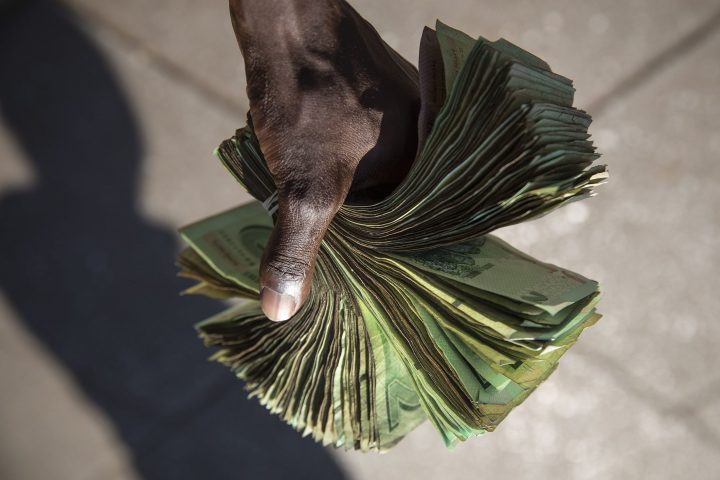CASH CRUNCH
Zimbabwean government bans largest mobile money transactional platforms

Due to cash shortages that have troubled the country for more than a decade, mobile money has become a currency among citizens who use it to send funds to their loved ones, buy airtime and pay for goods and services.
The Zimbabwean government without notice has abruptly banned the biggest transactional platform which uses mobile money, leaving millions of citizens stranded with hardly any mode of buying or selling. Authorities are citing financial sabotage by insiders whom they allege to have created a parallel central bank.
In a statement on 26 June, Zimbabwe’s Secretary for Information, Publicity and Broadcasting Services, Nick Ndabaningi Mangwana, said:
“Government has, with immediate effect, undertaken a series of prudent and co-ordinated interventions to deal with malpractices, criminality and economic sabotage perpetuated by wolves in sheepskin.
“All monetary transactions on phone-based mobile money platforms have been suspended in order to facilitate intrusive investigations, leading to the arrest and prosecution of offenders.
“Concurrently, the measures will also include suspension of all trading on the Zimbabwe Stock Exchange,” said Mangwana.
Operating as non-banking financial institutions, One-Money, MyCash, Tele-Cash and EcoCash are the only licensed mobile money platforms in Zimbabwe. Due to cash shortages that have troubled the country for more than a decade, mobile money has become a currency among citizens who use it to send money to their loved ones, buy airtime, pay for goods and services.
The biggest platform, Ecocash, which is owned by Econet Wireless Zimbabwe, quickly responded to the government announcement the following day, 27 June, saying:
“We urge all Ecocash users, who include 10 million Zimbabweans, the majority of whom do not have bank accounts, to remain calm and continue to do your lawful transactions as usual. Should there be any changes we shall give you adequate notice as required by law.”
EcoCash holds not less than ZWL$8-billion on its mobile-based Money Transfer Platform and has been accused by monetary authorities of running a Ponzi scheme in which it is alleged to be extending loans in the form of overdrafts to agent lines. The RBZ further accused EcoCash of fuelling illegal foreign currency dealings and called for strict control of agent lines which are being allegedly used to run foreign exchange dealings.
Renowned economist and Chief Executive Officer at Oxlink Capital, Brains Muchemwa told Daily Maverick:
“The banning of mobile money transactions was motivated by an erroneous and regrettable thinking among policymakers that it was responsible for fuelling the runaway exchange rate.
“Considering that mobile money constitutes about 83% of the volumes of transactions on the national payments system in Zimbabwe, the move disrupts business, dents confidence and credibility of the policymaking framework.
“The Reserve Bank of Zimbabwe (RBZ) should, instead, focus on targeting monetary aggregates that are overshooting their target by wide margins in order to reign on inflation that is now running above 700%.”
Following a public outcry over the secretary of information’s authority in pronouncing the ban and the subsequent confusion in the market, RBZ Governor John Mangudya on 27 June supported the government ban by issuing revised conditions through a Monetary Policy position stating:
“The unprecedented measures have been necessitated by the need to protect consumers on mobile money platforms which are being abused by unscrupulous and unpartisan individuals and entities to create instability and inefficiencies in the economy.”
Other mobile money platforms like One-Money have already deregistered agent lines transacting up to ZWL$2,000 a month and all reapplications will be vetted by the RBZ.
Under the new instructions, mobile money agents will not be allowed to move money out of their mobile wallets except when sending to the bank. This means businesses will not be able to pay their employees as before or other businesses using the platform. It is now required to move money to your bank in order to make these bulk payments.
The ban follows the recent introduction of an auction system by RBZ and the consequent refusal to accept the Zimbabwe dollar or bond notes as legal tender by citizens. Many retailers and businesses have already started pricing in United States dollars.
Pegged at a 1:1 parity with the United States dollar at inception, the Zimbabwe dollar rejection has left many traders stranded with the now useless currency, thereby exacerbating a structural liquidity crisis.
On the same day, 27 June, the Zimbabwe Stock Exchange Limited (ZSE) responded to the ban by closing all trading and related activities with immediate effect.
ZSE Ltd CEO Justin Bgoni said:
“Whilst we await guidance from our regulators on the operational modalities going forward, we notify our stakeholders that trading has been suspended until further notice.”
Independent economic analyst Persistence Gwanyanya told Daily Maverick:
“The RBZ statement was necessary to clear this confusion for uninterrupted business and more importantly to minimise the damage caused by disruption of transactions.”
A severe economic and financial crisis looms, aggravated by the Covid-19 pandemic, while labour unions and citizens are threatening unrest due to rapidly diminishing livelihoods.
Many banks closed operations in Zimbabwe, thereby hindering financial inclusion, but mobile money rose to the occasion and has evolved from a basic digital payment to being the biggest form and way of transacting in the country. DM

















 Become an Insider
Become an Insider